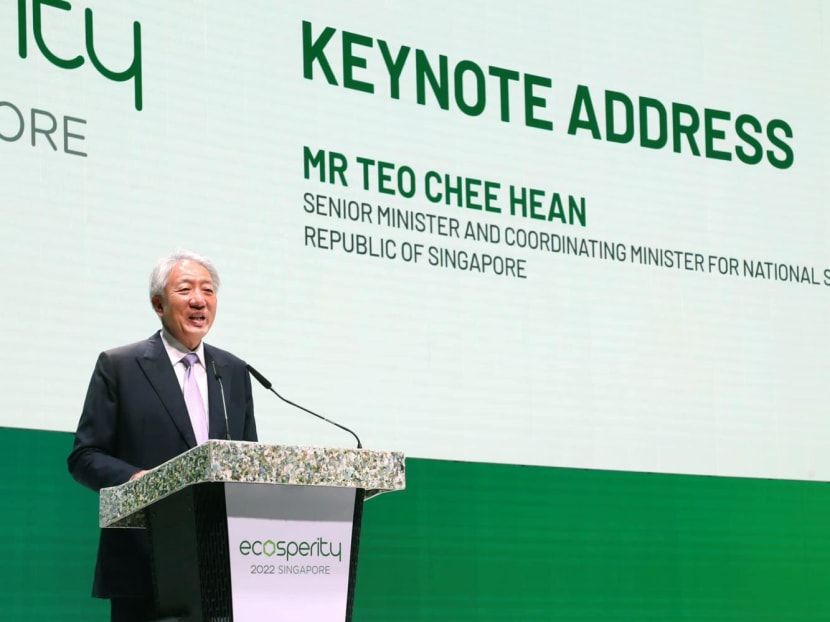Climate crisis and growing demand for sustainable practices mean it’s no longer business-as-usual for companies: Teo Chee Hean
SINGAPORE — To remain competitive in the long term, businesses will need to incorporate decarbonisation and climate risks into their strategies or risk being written off as “doing too little, too late”, said Senior Minister and Coordinating Minister for National Security Teo Chee Hean on Tuesday (June 7).

Senior Minister and Coordinating Minister for National Security Teo Chee Hean giving a speech at the sustainability conference Ecosperity Week on June 7, 2022.
SINGAPORE — To remain competitive in the long term, businesses will need to incorporate decarbonisation and climate risks into their strategies or risk being written off as “doing too little, too late”, said Senior Minister and Coordinating Minister for National Security Teo Chee Hean on Tuesday (June 7).
Speaking at sustainability conference Ecosperity Week, Mr Teo warned that the effects of climate change will affect businesses and disrupt their operating models and supply chains.
Growing awareness about the climate crisis has also changed how people define value in business, and what values a company upholds, he said.
“Companies can no longer solely focus on short-term returns from current assets and business lines,” he said, adding that shareholders, creditors, customers, and even employees will demand more sustainable practices and plans.
“As demand for sustainable practices increases, first movers will capture upsides while laggards may be written off as doing too little, too late.”
“Questions will be asked about your companies’ strategies to avoid stranded assets or legacy lines of production that may be rendered obsolete,” he said.
He pointed to the oil and gas industry, which has found itself under a harsh spotlight as concern over climate change increases in the world.
It has led the Big Five oil giants — Shell, ExxonMobil, BP, Chevron, and ConocoPhillips — to respond by pledging to reduce emissions. Shell, ExxonMobil and Chevron, which have major operations in Singapore, have committed to reaching net-zero emissions by 2050.
Mr Teo called on the private sector to do more to tackle climate change.
“Climate policies, technological advancements and stakeholder preferences will fundamentally impact what is the sustainable value of a company, and its valuation in the long term,” he said.
Mr Teo said the private sector and private finance have an important role in the shift towards the green economy, by providing investments to plug the financing gap, or taking the lead in adopting greener business models.
“Sustainable private financing and corporate net-zero targets have a powerful mutually reinforcing effect, by drawing capital preferentially towards sustainable projects and new opportunities in the global green economy,” he said.
“This in turn makes it more difficult and expensive for companies to obtain financing if their projects are not green.”
On Monday, Temasek launched a new investment platform company GenZero, which aims to accelerate decarbonisation globally.
Temasek committed an initial S$5 billion to establish GenZero, and a number of investments have already been made in the company’s focus areas which include tech-based as well as nature-based solutions, and carbon ecosystem enablers.
GETTING TO THE ROOT OF THE PROBLEM
Besides spurring private initiatives, government policies also play an important role in combating climate change, said Mr Teo.
This goes beyond reducing carbon emissions, and achieving sustainable development goals such as creating a circular economy, and building sustainable and liveable cities, he added.
“Governments need to have the right policies that get to the root of the problem, and create solutions at the system level,” he said.
Citing sustainable urban transportation as an example, he said Singapore has invested heavily in public transport to minimise the need for cars.
“Sustainable urban transportation is not just about replacing all internal combustion engine (ICE) vehicles with electric vehicles,” he said.
“If we did that, we will convert our traffic jams with ICE vehicles today with electric vehicles,” he said.
Instead, he said the more fundamental system solution is to minimise the need for cars, through well-integrated urban planning and a comprehensive public transport system.
The country has set a target of limiting peak hour journeys to no more than 45 minutes under its Land Transport Master Plan 2040.
Mr Teo said the country is already two-thirds of the way to achieving this target.
Later this year, Singapore will update its long-term low emissions development strategy (LEDS), along with its revised plans to achieve Singapore’s net-zero goals by 2050.
UNLOCKING GREENER SOLUTIONS
Mr Teo stressed the need to continue exploring emerging technologies that could bring about more sustainable solutions in the longer term.
These include carbon capture, utilisation and storage and green hydrogen.
“If we use technology right, it can be a valuable tool to help us overcome resource constraints and unlock greener and more sustainable solutions,” he said.
He added that Singapore has been putting in place “the building blocks” to support a high integrity carbon credits ecosystem and invited like-minded researchers and investors to use the country not just as a testbed but as a launchpad to build regional capabilities.
“We hope this helps to unlock the potential of the APAC region and develop mutually beneficial partnerships and solutions for our climate challenge,” he said. CNA









